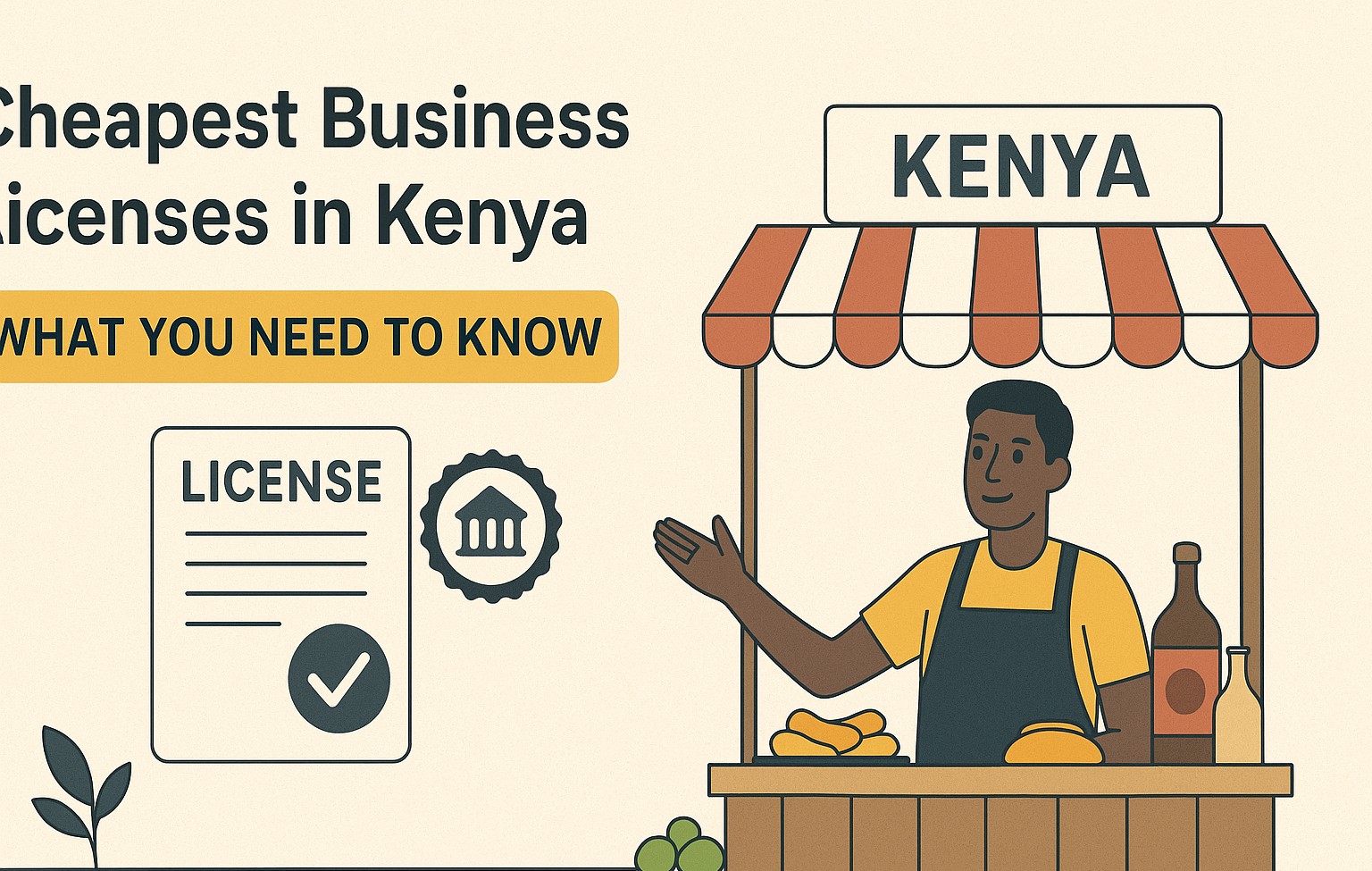

Titus Morebu
Author
Cheapest Business Licenses in Kenya: What You Need to Know (2025)
Explore Kenya’s lowest-cost business licenses, fees, and how to get licensed affordably. A guide for startups and small businesses in 2025.
Understanding Business Licenses in Kenya 💡
Whether you’re launching a small kiosk, a food stand, or a full-blown enterprise, getting the right license in Kenya is crucial. Licenses protect you legally, help you comply with local regulations, and allow you to operate without fear of fines or closure. But what’s the cheapest way to get licensed? And how much should you expect to pay?
Types of Licenses & Permits You Might Need
- Business Name/Company Registration – for legal recognition of your business entity.
- Single Business Permit / Unified Business Permit (UBP) – issued by county governments; allows general trade, retail, services.
- Industry-Specific Licenses – such as health/hygiene, fire safety, environmental (NEMA), food handling, signage, etc.
- Special Permits – for sectors like construction, transport, import/export, financial services.
Cheapest License Costs: What the Numbers Look Like
Below is a breakdown of the lowest licensing fees currently in various counties and for different business types. These are good benchmarks if you want to aim for a low-cost licensing path.
| License / Registration | Typical Minimum Cost (KES) | Who It’s For |
|---|---|---|
| Business Name Registration (sole proprietor / partnership) | ~ KES 950 | Small local business, individual owners |
| Private Limited Company Incorporation | ~ KES 10,650 | Business wanting limited liability |
| Limited Liability Partnership (LLP) | ~ KES 25,000 | Partners who want liability protection without full company structure |
| Single Business Permit / Business Permit (County level) | ~ KES 2,000 – 5,000 | Small/informal traders, small shops, kiosks |
| County permit for “other informal sector” trader | ~ KES 2,000 | Street vendors, small service providers |
What Determines the Price: Why Some Licenses Cost More
Even for the same type of permit, costs vary widely. Here’s what causes the differences:
- Location / County – Major cities like Nairobi tend to charge higher rates than rural counties.
- Size of premises – bigger shops = more expensive.
- Business type and risk profile – high-risk operations (food, health, chemicals) incur additional fees (e.g. hygiene, fire safety, environmental).
- Number of employees – more employees may increase permit costs.
- Nature of business (informal vs formal) – informal traders get lower fees, sometimes by design of county finance acts.
Recent Changes & Subsidies That Cut Costs
2024-2025 has seen some cost reductions and favorable policy moves:
- Kiambu County Finance Act 2024/25 slashed trade license fees by ~50% for many categories. Example: small communication businesses’ fees fell from ~ KES 4,100 to ~ KES 1,500. Food hygiene fees for “vibandas” reduced significantly.
- Unified Business Permit (UBP) in Nairobi replaced multiple licenses with a consolidated permit, reducing overlapping costs.
- Some counties now allow payment in installments rather than full annual fees, easing cash flow.
Step-by-Step: How to Get the Cheapest Legitimate License
- Choose the simplest legal structure possible (e.g., sole proprietorship or partnership) to avoid high incorporation fees.
- Register your business name via the eCitizen portal; that’s often the lowest regulatory cost (≈ KES 950).
- Obtain a Single Business Permit / Unified Business Permit by your county; during finance act reviews, check for fee reductions or discounts.
- If your business involves food, health, fire etc., only apply for needed licenses. Avoid extras unless your operations require them.
- Explore county‐led subsidies or policy changes; stay updated with your county’s finance act.
- Apply online where possible – many counties now have digital portals which reduce delays and extra fees.
Example: Cost Scenarios for Small Businesses
Here are two illustrative examples:
- Business name registration: ~ KES 950
- Single Business Permit: ~ KES 2,000-5,000
- No extra health or fire permits required
- Total first-year cost: approx KES 3,000-6,000
- Business name registration: ~ KES 950
- UBP + Single Business Permit: maybe ~ KES 5,000-15,000
- Health / Public Health license: a few thousand shillings extra
- Fire safety / pest control if needed
- Total first-year cost: could run to ~ KES 12,000-25,000 depending on county and premises
Key Places to Confirm Costs & Rules
Because fees, categories, and requirements vary by county and type of business, it’s crucial to check official sources. Here are high-authority places to get accurate information:
- Business Registration Service (Kenya) – for registration fees.
- Nairobi City County eServices Portal – for UBP and county permit rates.
- Kenya Trade Portal – for county licensing schedules.
Tips to Avoid Hidden Costs
- Ensure your premises classification (size, use) is correct, so you aren’t charged for a larger category by mistake.
- Prepare all required documents correctly to avoid rejections or re-submissions that cost extra.
- Renew permits on time; penalties for late renewal sometimes double effective cost.
- Keep up with county finance acts – they often change fees annually or with inflation.
Conclusion
Getting licensed in Kenya doesn’t have to be expensive. If you're a small or informal business, you can legally operate for just a few thousand Kenyan shillings per year — especially if you leverage the lowest-cost structure and avoid unnecessary extra permits. Always check your specific county’s rates and recent finance acts to ensure you get the best deal. With the right approach, you can stay compliant without breaking the bank. Good luck in your business journey! 🚀
Gallery

Related Articles
3 articles
How TitoCreations Empowers Kenyan Entrepreneurs With Smart Business Systems
Discover how TitoCreations equips Kenyan entrepreneurs with profitable business ideas and modern software systems to start, manage, and scale successful ventures.

How to Start Poultry Farming in Kenya 2026: A Complete Step-by-Step Guide to Profit
Learn how to start and run a profitable poultry farm in Kenya in 2026 with up-to-date setup, costs, management, marketing, and profit strategies.

Freelancing in Kenya: How to Start With No Experience 2026
Learn how to start freelancing in Kenya with zero experience, build marketable skills, find clients, and earn KES or dollars online in 2026.